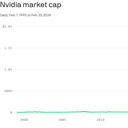Nvidia's $2 trillion market cap looks bubbly

AI chipmaker Nvidia topped $2 trillion in market cap on Friday less than nine months after crossing the $1 trillion threshold.
Why it matters: AI-drunk investors have bid up Nvidia, whose advanced chips power AI systems, to bubble-like levels. The company's stock chart parties like it's 1999 — and we all remember what happened to the dotcom era darlings a year later.
- AI is no fad, but neither was the internet. That didn't stop dotcom stocks from collapsing.
Driving the news: The company gained $277 billion in value Thursday — Wall Street's biggest single-day gain ever, per Reuters — after its quarterly earnings, reported Wednesday, suggested the AI boom has legs.
- Nvidia's wild ride is propelled by demand for its graphics processors, which have turned out to be ideal not only for Bitcoin mining — which drove a previous wave of Nvidia mania — but also for the kind of number-crunching that ChatGPT and similar AI programs demand.
Yes, but: That demand is probably at its peak right now.
- Both the moment's AI mania and global shortages of the most advanced processors have placed a premium on Nvidia's products. That premium is a lot more likely to erode than hold.
- You can't ramp up a chip powerhouse overnight, but over time Nvidia will face a rising wave of competitors.
- New research breakthroughs could radically alter the technical needs of AI systems, reducing reliance on Nvidia's super-chips.
The stock market, in other words, is doing the opposite of what it's supposed to — it's responding to the present moment's obsessions rather than predicting future profit growth.
Flashback: We just lived through something similar with the brief COVID-driven bubble in tech that triggered layoffs and cuts once it popped.
- During the pandemic, lots of companies grew fat and added market value based on the idea that trends like videoconferencing, food delivery and work-from-home would keep growing forever.
- Spoiler: they didn't.
The bottom line: Investors who bought Nvidia a while ago are very happy. Those who buy it today may not be.